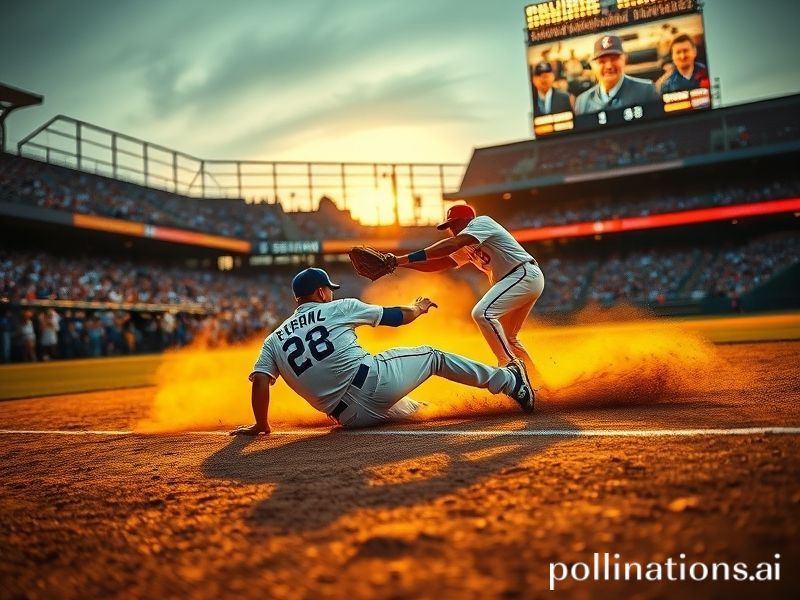Dodgers vs Phillies: How a Random Baseball Game Became the World’s 3-Hour Vacation from Collapse
LOS ANGELES — Somewhere between the 7th-inning stretch and the next geopolitical crisis, the Dodgers and Phillies resumed their ancient ritual of bat-meets-ball, a pastoral pageant now beamed to 182 territories that haven’t known a pastoral day in their collective lives. From Kyiv bomb shelters to Lagos traffic jams, insomniacs toggled between BBC alerts and a baseball feed that looked, at first glance, like two groups of millionaires in pajamas playing catch-me-if-you-can. Yet the scoreboard—Dodgers 6, Phillies 4—flashed across the world’s phones with the same urgency as a currency devaluation. Why? Because in 2024, even meaningless May baseball is a Rorschach test for whatever fresh hell the planet is inhaling.
Consider the pitching staff as a liquid-crystal allegory of global supply chains. Los Angeles’ starter, a Japanese sensation who throws 99-mph cuties stitched in Costa Rica, was pulled after 87 pitches because a California state law limits adolescent athletes to protect Ulnar collateral ligaments that surgeons in Seoul have already patented replacement methods for. Meanwhile, Philadelphia’s hurler—born in Cuba, raised on Florida’s foreclosure circuit—needed 34 seconds between throws to consult an iPad whose rare-earth minerals were probably mined by a Congolese teenager making the league-minimum of survival. The broadcast never mentions this; instead, the commentary team debates “pace of play,” a euphemism for shortening the only affordable opera the working class still attends.
In Taiwan, semiconductor engineers took the under on total runs, gambling a week’s salary on whether American bullpens could hold a two-run lead—an existential question they also ask about U.S. naval commitments. The bet settled in Dogecoin, because nothing says late-stage capitalism like wagering your future on a meme currency while watching a game invented during Reconstruction. When the Dodgers’ closer walked two batters, micro-spikes in Taipei’s electricity usage were recorded as 14,000 air-conditioners simultaneously sighed; apparently despair is carbon-intensive.
Across the Atlantic, European insomniacs greeted the final out with the same numb gratitude they reserve for 0-0 Champions League group-stage draws. “At least nobody staged a military parade,” muttered a Berliner who’d spent the afternoon watching Russian state TV reruns of last year’s Victory Day. He has a point: compared with armored columns, Mookie Betts’ diving catch is a pacifist tableau—though the glove was manufactured in a Vietnamese factory whose safety ratings rival Chernobyl’s sarcophagus.
Back in Chavez Ravine, the post-game fireworks detonated on cue, scattering magnesium confetti over a city whose air-quality app advised “limited outdoor exposure.” Season-ticket holders uploaded slo-mo clips captioned #Blessed, unaware that Instagram’s algorithm simultaneously served them ads for wildfire-proof roofing. The Phillies boarded a charter flight that burned 7,600 pounds of jet fuel per hour, roughly the annual carbon budget of a Maldivian citizen whose island will be underwater by the time Bryce Harper’s contract expires. Harper, earning $25 million this season, told reporters he “just wants to bring joy to the fans,” a sentiment the UN has yet to list as a sustainable development goal.
Still, the game matters—if only as a planetary sedative. For three hours, nuclear powers refrained from launching anything more explosive than a hanging slider. Crypto markets flatlined; even the algorithmic traders paused to calculate exit velocity. Somewhere in the International Space Station, astronauts—who circle the globe every 90 minutes—watched the feed and noted that Dodger blue matches the color of unfiltered ocean from 400 km up. They did not place bets; they have already won the ultimate away game.
When the stadium lights finally dimmed, the final box score joined the cloud archive of human minutiae, ready to be data-mined by a future civilization that will marvel at our priorities. Until then, the planet spins, the standings update, and tomorrow another first pitch will rise like a false dawn over a world that keeps swinging—and mostly missing—at salvation.







